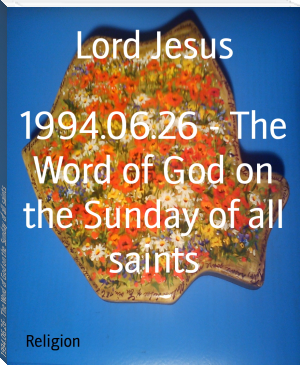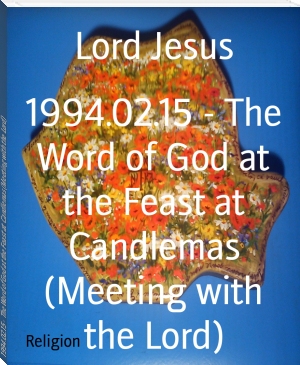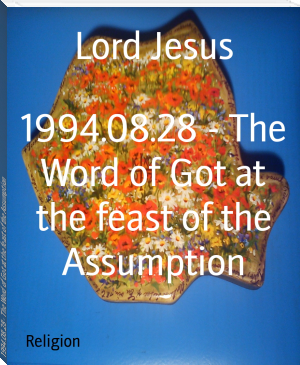Orthodoxy, G. K. Chesterton [10 ebook reader txt] 📗

- Author: G. K. Chesterton
- Performer: -
Book online «Orthodoxy, G. K. Chesterton [10 ebook reader txt] 📗». Author G. K. Chesterton
Had he faced his thought without metaphors, he would have seen that it was nonsense. So, when he describes his hero, he does not dare to say, “the purer man,” or “the happier man,” or “the sadder man,” for all these are ideas; and ideas are alarming. He says “the upper man,”
or “over man,” a physical metaphor from acrobats or alpine climbers.
Nietzsche is truly a very timid thinker. He does not really know in the least what sort of man he wants evolution to produce.
And if he does not know, certainly the ordinary evolutionists, who talk about things being “higher,” do not know either.
Then again, some people fall back on sheer submission and sitting still. Nature is going to do something some day; nobody knows what, and nobody knows when. We have no reason for acting, and no reason for not acting. If anything happens it is right: if anything is prevented it was wrong. Again, some people try to anticipate nature by doing something, by doing anything.
Because we may possibly grow wings they cut off their legs.
Yet nature may be trying to make them centipedes for all they know.
Lastly, there is a fourth class of people who take whatever it is that they happen to want, and say that that is the ultimate aim of evolution. And these are the only sensible people.
This is the only really healthy way with the word evolution, to work for what you want, and to call THAT evolution. The only intelligible sense that progress or advance can have among men, is that we have a definite vision, and that we wish to make the whole world like that vision. If you like to put it so, the essence of the doctrine is that what we have around us is the mere method and preparation for something that we have to create.
This is not a world, but rather the material for a world.
God has given us not so much the colours of a picture as the colours of a palette. But he has also given us a subject, a model, a fixed vision. We must be clear about what we want to paint.
This adds a further principle to our previous list of principles.
We have said we must be fond of this world, even in order to change it.
We now add that we must be fond of another world (real or imaginary) in order to have something to change it to.
We need not debate about the mere words evolution or progress: personally I prefer to call it reform. For reform implies form.
It implies that we are trying to shape the world in a particular image; to make it something that we see already in our minds. Evolution is a metaphor from mere automatic unrolling. Progress is a metaphor from merely walking along a road—very likely the wrong road. But reform is a metaphor for reasonable and determined men: it means that we see a certain thing out of shape and we mean to put it into shape.
And we know what shape.
Now here comes in the whole collapse and huge blunder of our age.
We have mixed up two different things, two opposite things.
Progress should mean that we are always changing the world to suit the vision. Progress does mean (just now) that we are always changing the vision. It should mean that we are slow but sure in bringing justice and mercy among men: it does mean that we are very swift in doubting the desirability of justice and mercy: a wild page from any Prussian sophist makes men doubt it. Progress should mean that we are always walking towards the New Jerusalem. It does mean that the New Jerusalem is always walking away from us. We are not altering the real to suit the ideal. We are altering the ideal: it is easier.
Silly examples are always simpler; let us suppose a man wanted a particular kind of world; say, a blue world. He would have no cause to complain of the slightness or swiftness of his task; he might toil for a long time at the transformation; he could work away (in every sense) until all was blue. He could have heroic adventures; the putting of the last touches to a blue tiger.
He could have fairy dreams; the dawn of a blue moon. But if he worked hard, that high-minded reformer would certainly (from his own point of view) leave the world better and bluer than he found it.
If he altered a blade of grass to his favourite colour every day, he would get on slowly. But if he altered his favourite colour every day, he would not get on at all. If, after reading a fresh philosopher, he started to paint everything red or yellow, his work would be thrown away: there would be nothing to show except a few blue tigers walking about, specimens of his early bad manner.
This is exactly the position of the average modern thinker.
It will be said that this is avowedly a preposterous example.
But it is literally the fact of recent history. The great and grave changes in our political civilization all belonged to the early nineteenth century, not to the later. They belonged to the black and white epoch when men believed fixedly in Toryism, in Protestantism, in Calvinism, in Reform, and not unfrequently in Revolution.
And whatever each man believed in he hammered at steadily, without scepticism: and there was a time when the Established Church might have fallen, and the House of Lords nearly fell.
It was because Radicals were wise enough to be constant and consistent; it was because Radicals were wise enough to be Conservative.
But in the existing atmosphere there is not enough time and tradition in Radicalism to pull anything down. There is a great deal of truth in Lord Hugh Cecil’s suggestion (made in a fine speech) that the era of change is over, and that ours is an era of conservation and repose.
But probably it would pain Lord Hugh Cecil if he realized (what is certainly the case) that ours is only an age of conservation because it is an age of complete unbelief. Let beliefs fade fast and frequently, if you wish institutions to remain the same.
The more the life of the mind is unhinged, the more the machinery of matter will be left to itself. The net result of all our political suggestions, Collectivism, Tolstoyanism, Neo-Feudalism, Communism, Anarchy, Scientific Bureaucracy—the plain fruit of all of them is that the Monarchy and the House of Lords will remain.
The net result of all the new religions will be that the Church of England will not (for heaven knows how long) be disestablished.
It was Karl Marx, Nietzsche, Tolstoy, Cunninghame Grahame, Bernard Shaw and Auberon Herbert, who between them, with bowed gigantic backs, bore up the throne of the Archbishop of Canterbury.
We may say broadly that free thought is the best of all the safeguards against freedom. Managed in a modern style the emancipation of the slave’s mind is the best way of preventing the emancipation of the slave. Teach him to worry about whether he wants to be free, and he will not free himself. Again, it may be said that this instance is remote or extreme. But, again, it is exactly true of the men in the streets around us. It is true that the negro slave, being a debased barbarian, will probably have either a human affection of loyalty, or a human affection for liberty. But the man we see every day—the worker in Mr. Gradgrind’s factory, the little clerk in Mr. Gradgrind’s office—he is too mentally worried to believe in freedom. He is kept quiet with revolutionary literature.
He is calmed and kept in his place by a constant succession of wild philosophies. He is a Marxian one day, a Nietzscheite the next day, a Superman (probably) the next day; and a slave every day.
The only thing that remains after all the philosophies is the factory.
The only man who gains by all the philosophies is Gradgrind.
It would be worth his while to keep his commercial helotry supplied with sceptical literature. And now I come to think of it, of course, Gradgrind is famous for giving libraries. He shows his sense.
All modern books are on his side. As long as the vision of heaven is always changing, the vision of earth will be exactly the same.
No ideal will remain long enough to be realized, or even partly realized.
The modern young man will never change his environment; for he will always change his mind.
This, therefore, is our first requirement about the ideal towards which progress is directed; it must be fixed. Whistler used to make many rapid studies of a sitter; it did not matter if he tore up twenty portraits. But it would matter if he looked up twenty times, and each time saw a new person sitting placidly for his portrait.
So it does not matter (comparatively speaking) how often humanity fails to imitate its ideal; for then all its old failures are fruitful.
But it does frightfully matter how often humanity changes its ideal; for then all its old failures are fruitless. The question therefore becomes this: How can we keep the artist discontented with his pictures while preventing him from being vitally discontented with his art?
How can we make a man always dissatisfied with his work, yet always satisfied with working? How can we make sure that the portrait painter will throw the portrait out of window instead of taking the natural and more human course of throwing the sitter out of window?
A strict rule is not only necessary for ruling; it is also necessary for rebelling. This fixed and familiar ideal is necessary to any sort of revolution. Man will sometimes act slowly upon new ideas; but he will only act swiftly upon old ideas. If I am merely to float or fade or evolve, it may be towards something anarchic; but if I am to riot, it must be for something respectable. This is the whole weakness of certain schools of progress and moral evolution.
They suggest that there has been a slow movement towards morality, with an imperceptible ethical change in every year or at every instant.
There is only one great disadvantage in this theory. It talks of a slow movement towards justice; but it does not permit a swift movement.
A man is not allowed to leap up and declare a certain state of things to be intrinsically intolerable. To make the matter clear, it is better to take a specific example. Certain of the idealistic vegetarians, such as Mr. Salt, say that the time has now come for eating no meat; by implication they assume that at one time it was right to eat meat, and they suggest (in words that could be quoted) that some day it may be wrong to eat milk and eggs. I do not discuss here the question of what is justice to animals. I only say that whatever is justice ought, under given conditions, to be prompt justice.
If an animal is wronged, we ought to be able to rush to his rescue.
But how can we rush if we are, perhaps, in advance of our time? How can we rush to catch a train which may not arrive





Comments (0)